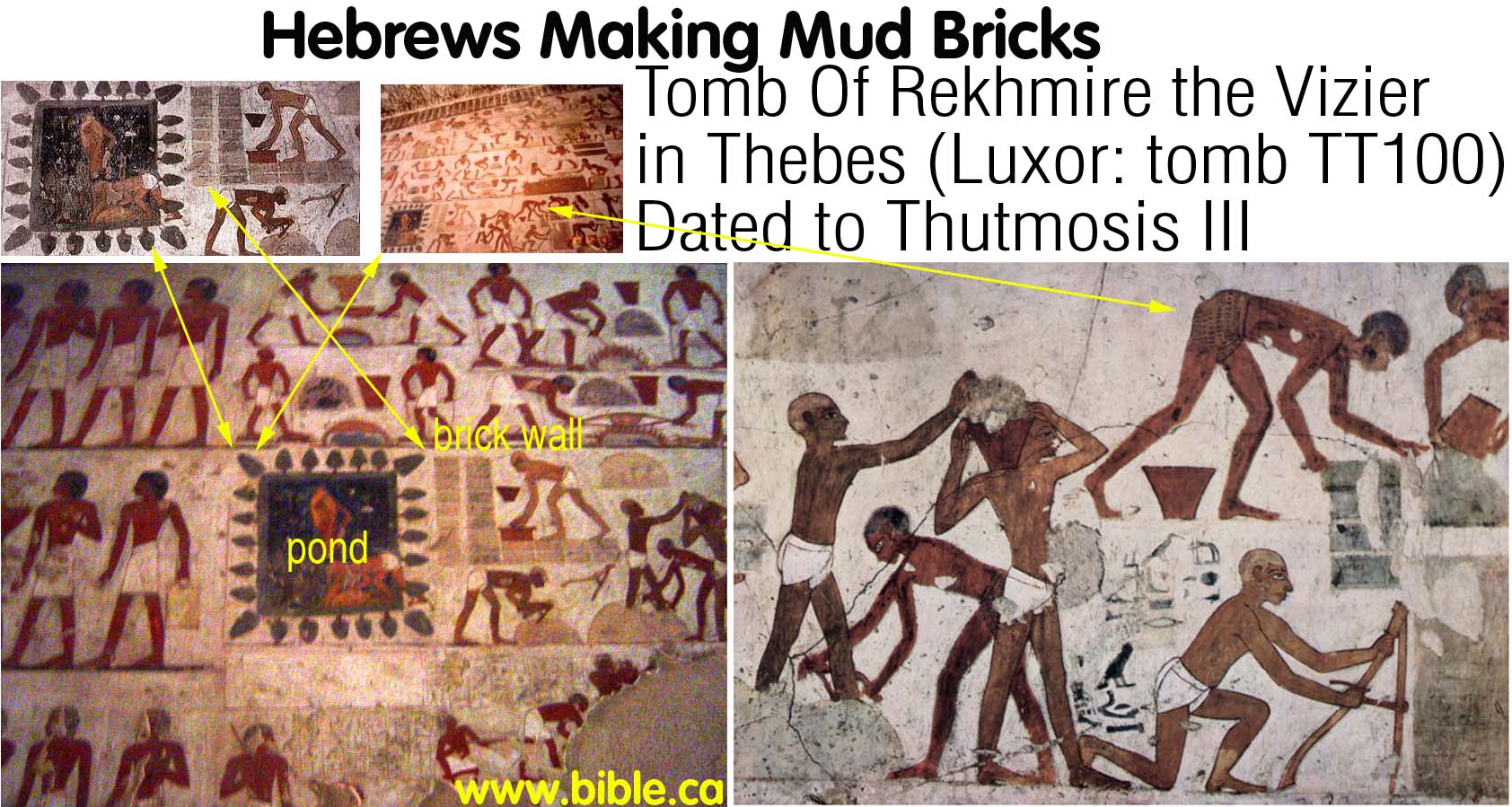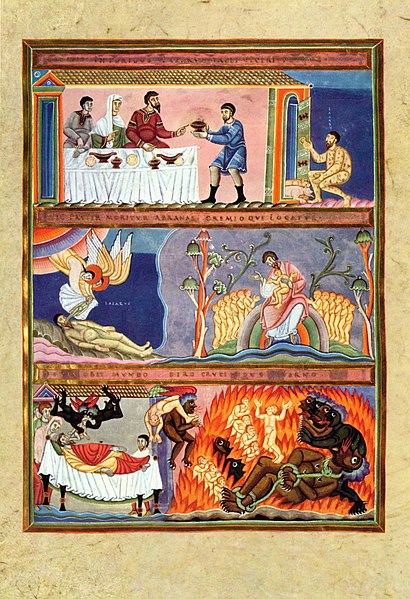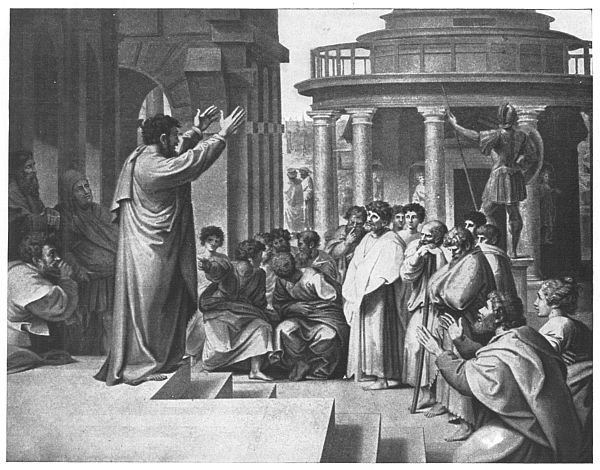Is success a sign for us?
Moses is told that the arrival of the Hebrew people at the mountain again (his return to the same place with them) for worship will be a sign that God had sent him on his mission to deliver the Israelite captives from Egypt. What are our after-the-fact signs that God has sent us on our mission? What is the sign that we are receiving a kingdom that cannot be shaken (Hebrews)? Is it our unity? (John 17)Exodus 3:1-12
One of my favorite stories in the Old Testament is the one where Moses encounters the bush "that burns but is not consumed." The classic scene portrays Moses with his sheep near Mount Horeb, catching sight of the burning bush: immediately Moses is both attracted to the sight and a little apprehensive.
(Image source, http://upload.wikimedia.org/wikipedia/commons/c/c9/CofSBurningBushLogo.JPG)
[Both the the Church of Scotland and the Presbyterian Church in Ireland, the roots of our own Scotch-Irish Presbyterian churches in the USA, have in their seals and logos this burning bush. It is a symbol of the kirk. The motto of the Presbyterian Church in Ireland is Ardens sed Virens, "burning but flourishing."]
(Image source, http://upload.wikimedia.org/wikipedia/en/7/7e/Pci_burningbush.PNG)

(Image source, http://upload.wikimedia.org/wikipedia/en/8/8a/Presbyterian_church_in_ireland_logo.png)
Perhaps Moses knew the reputation of the place. After all, this was Mt. Horeb, "the mountain of God." Perhaps Moses experienced something like the attraction that children in an old black and white haunted house movie do, who peer through the wrought-iron fence toward an old house that exercises their imaginations. They pass the ever-growing reputation of the place back and forth among themselves in whispers, while daring one another to trespass onto the estate and perhaps even to spend a whole night inside the house. Sooner or later, they see a light shining in a window or out on the grounds, and they are drawn reluctantly but inexorably inside.
(Image source, http://www.cyberhomes.com/CONTENT/Libraries/Blog_Pictures/Haunted_House.sflb)
While Moses has been inspecting the attractive-repulsive phenomenon of the burning bush, God has also been taking stock of Moses. And when Moses gets close enough, God calls out to remind Moses to mind his manners. Moses is not in his own home; he's at God's place. But God's invitation also means that Moses has finally arrived back at home; until now, in Pharaoh's court and in Egypt, Moses has not felt at home or connected to family. Now he is welcomed with a gesture of familiarity and a certain amount of intimacy. Taking off your shoes as a guest in someone else's home meant both that you honored your host--that you would follow the host's rules while you were in their home, receiving their hospitality--but also that you felt comfortable enough (un-threatened, at ease) to accept the familiarity and intimacy of removing your footwear and leaving it at the door.

(Image source, http://wordincarnate.files.wordpress.com/2008/12/burning_bush.jpg)
The more usual scene in classical artwork has Moses closer to the bush, engaged with God, but with his sandals removed and his face covered/shielded, and/or his eyes averted from looking directly at God.
(Image source, http://www.babble.com/CS/blogs/strollerderby/2008/07/01-07/shoes-ath-001.JPG)
For weeks now we've been talking about the need for hospitality--both receiving and offering hospitality--for life as a disciple of Jesus. Today, somewhat unexpectedly, the first thing we run into is another sign of the importance God attaches to what we might consider small acts of welcome and respect. The invitation to take off your shoes is at once both a sign of respect for God's holiness (no need to track up God's floor with the accumulated dirt of our living) and an invitation to make ourselves at home. It is a small act of intimacy (something that strangers, the uninvited, and the unwelcome are not invited to do) that shows respect for someone else's home.

(Image source, http://www.apartmenttherapy.com/uimages/la/102709shoes-01.jpg)
Although Moses would appear to be alone at Mt. Horeb, enjoying a one-on-one visit with God at home--this friendly, cozy scene is disrupted by the return of a vision shared between God and Moses of "the misery" of Hebrew slaves in Egypt, making bricks for the Pharaoh.

(Image source, http://www.mitchellteachers.net/WorldHistory/AncientEgyptNearEastUnit/Images/EgyptDailyLife/AncientEgyptDailyLifeHousingPic_large.jpg)

(Image source, http://www.bible.ca/archeology/archeology-TT100-tomb-of-rekhmire-vizier-thutmosisIII-hebrews-making-mud-bricks-thebes-luxor.jpg)
God comes quickly to the point of the visit:
I have observed the misery of my people who are in Egypt; I have heard their cry on account of their taskmasters. Indeed, I know their sufferings, and I have come down to deliver them from the Egyptians, and to bring them up out of that land to a good and broad land, a land flowing with milk and honey, to the country of the Canaanites, the Hittites, the Amorites, the Perizzites, the Hivites, and the Jebusites. The cry of the Israelites has now come to me; I have also seen how the Egyptians oppress them. So come, I will send you to Pharaoh to bring my people, the Israelites, out of Egypt." (Exodus 3:7-10, NRSV)
In other words, God wants to bring his people home to himself and to Canaan.
Moses objects strenuously. He agrees that the work needs to be done, but he objects to the idea that he, Moses, is qualified to do it. (Exodus 3:11) He anticipates that the Israelites will be reluctant to follow. (Exodus 4:1) Moses recognizes his own lack of eloquence. (Exodus 4:10) He even asks God to send someone else. (Exodus 4:13)
God responds directly to each of Moses' objections, providing assurance that the mission is indeed possible with God's help. Though much could be said about each of these assurances, I want to focus on one that most often gets overlooked, the assurance in the interim that he is on the right track, that he has indeed heard the Word of the Lord. That assurance comes as a promise that Moses will return to this very place, and when he does he will not return alone.

(Image source, http://awtravelogues.com/RegionsOfTheWorld/MiddleEast/Exodus%20Photos/MtSinaiValley.jpg)
In other words, God's house, Mt. Horeb, is a place very much on-the-way and in-between slavery in Egypt and life in Canaan. It is an oasis, a way station, a half-way house. It is not Canaan, their final destination, a land "flowing with milk and honey." But it is the mountain of God, Mt. Horeb; it is the place of burning bush and flourishing people. It is a place of escape and regrouping for the next part of their journey with God. They will stay for a little while at the very spot where the burning bush once stood, so that Moses and the people may be reassured that God is the author of their journey and the one who will bring them safely to its conclusion.
Hebrews 12:18-29
The writer of the book of Hebrews refers directly to the Exodus experience. The scene is one of modern worship and service with our shoes off, our eyes averted, and our faces hid from the presence of God. The writer of Hebrews (a preacher of long sermons) compares his readers (listeners) favorably to the Hebrews of the Exodus, but he also notes a significant difference. The burning bush and smoking mountain were physical realities at Mt. Horeb (the intermediate mountain, the mountain on-the-way to the promised land) in the Old Testament. The mountain to which we repair (come) is symbolized as Mt. Zion (the final destination, the promised land). This mountain is not physical, it is invisible. But the God we serve is no less alive than the fire that burned in the bush, and Jesus still offers himself to us, even from his place of ascension (heaven). It we refuse this offer, our world will be shaken. All that we know and cherish is temporal, fading, and subject to entropy. It will soon be gone. The only thing that will remain is his kingdom and our investment in it by his grace. So, heed the call to find those places near to Mt. Zion, places of acceptance, thanksgiving, offering, worship, reverence and awe. For our God too is a consuming fire.
John 17:20-26
Jesus prays for a different kind of proximity to God--and different signs of mission success--for his followers. Instead of returning to camp near a holy mountain (either Horeb or Zion), Jesus prays that his disciples will take up permanent residence "in" God and God take up residence "in" them. He prays that they may immerse themselves completely in this Burning-Fire-of-a-God through the passion of their love for one another. By doing this, they become the holy mountain and the burning bush for others, creating a holy place known as "unity" toward which others are attracted to see this strange sight.



 >
>
 Peter Greenaway has created a 'son et lumiere' of Leonardo's Last Supper, http://www.theage.com.au/news/entertainment/arts/arts-reviews/leonardos-last-supper/2009/10/12/1255195742166.html?page=fullpage. (Image source, http://images.theage.com.au/ftage/ffximage/2009/10/14/supper_narrowweb__300x446,0.jpg)
Peter Greenaway has created a 'son et lumiere' of Leonardo's Last Supper, http://www.theage.com.au/news/entertainment/arts/arts-reviews/leonardos-last-supper/2009/10/12/1255195742166.html?page=fullpage. (Image source, http://images.theage.com.au/ftage/ffximage/2009/10/14/supper_narrowweb__300x446,0.jpg)



